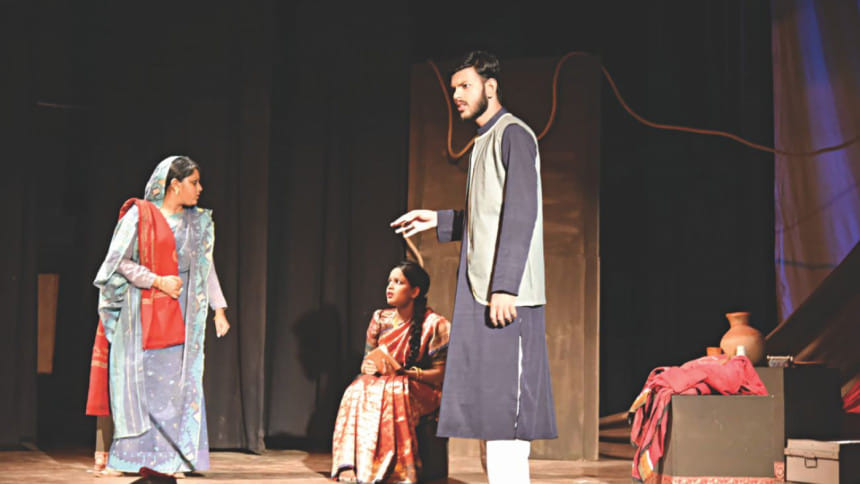Pir who speaks textbook language

Pir (variant spelling: Peer) is purely a subcontinent concept that has etymological root in Persian language. In English, the word can be translated into saint or more specifically, holy man. I lived in Libya for almost four years, and I never had any confrontation with any Pir there, and I also came to know from the people who had been to different Muslim countries like Saudi Arabia or other nearby Arab countries having close affinity with Islam, that belief in Pir and their divine powers are considered anti-Islamic. I also had the opportunity to listen to an anecdote about a very highly educated and revered religious person from Bangladesh getting into huge trouble in Saudi Arabia because a good number of Muslim people from the subcontinent working there used to consider and esteem him as Pir, and would visit him routinely for his blessings. So, Pir is purely an Indian subcontinent connotation, referring to a religious head that shows ordinary people the path to heaven, and as a result, we have innumerable Pirs and their majars (tombs or shrines) throughout India, Pakistan and Bangladesh. A considerable population in all these countries has convincing belief in their divine powers.
Syed Waliullah, a Bangla novelist, short story writer and playwright, wrote at least two fictions on this theme—Lalsalu, a novel (translated in English, titled Tree Without Roots, by the writer himself), and Bohipeer, a stage play. The two other plays that he wrote are: Tarangabhanga and Sudanga (সুড়ঙ্গ). As far as my knowledge goes, two of his plays — Bohipeer and Tarangabhanga — were performed with a considerable degree of success (but not as expected as per their latent contemporaneity) in Bangladesh.
One can effortlessly trace feministic hints in Syed Waliullah's literary works, especially in Lalsalu and Bohipeer. Waliullah, like Abu Ishaque, another Bangla writer of fame, wrote fictions about religious bigotry and exploitations of marginal and subaltern population, including women and children by the privileged and powerful. The most fascinating fact is, both writers were contemporaries—Syed Waliullah was born in 1922 and Abu Ishaque in 1926. One also finds it intriguing that both of them were troubled with social taboos stemming from illiteracy and blind faith in religion, during late 40s and 50s, when Pakistan came into being in the name of Islamic ideology. Though Abu Ishaque did not write any play, his novels have distinct empathy with the themes of Waliullah's novels and plays.
As a literary work, Bohipeer has an all-time pertinence in Bangladesh, more so in a society that has been gradually submerging into the influence of oil-rich Gulf cultures. To me, this is because those countries have been employing a huge number of blue-collar workers from Bangladesh—both skilled and unskilled—for manual labour, for about three decades now. The metamorphosis started almost twenty years back, and its influence is quite discernible in our present day social context and practices. Dhaka Theatre Moncha has done a great job revitalising Bohipeer on our stage at a time when we feel the growing heat-wave of fundamentalism at home and abroad. Though I cannot give them unrestricted words of praise for their performance quality, I have all admiration for their bravado and aptness. Director of the play, Afrin Huda Tora — a young, yet erudite person of dramaturgy — has befittingly tailored and customised the play to focus a lone woman's logic for survival, rebelling against the imposed pronouncements of a male dominated community that is mostly obsessed with religious biases. The message could have been statelier if Tora and her cast had concentrated more on physical and facial expressions, and acts rather than on their voice projections, for that effort of theirs marred the acting quality considerably. As for set, light and props, those were a bit more than run-of-the mill — there were scopes for further innovation.
I am a believer in youth charisma and adroitness, which allure me a lot, though I am also aware of the fact that they do not have all the required or desirable qualities or characteristics in them — but what they have is perhaps, the most sought-after and coveted constituent for gaining success in future (if fostered appropriately): faith, sincerity and devotion. At the end of the day, we must remind ourselves: practice brings perfection.
The writer is an educationist teaching English Language & Literature at Central Women's University. He is also a Bangla Academy awardee for translation.

 For all latest news, follow The Daily Star's Google News channel.
For all latest news, follow The Daily Star's Google News channel. 



Comments